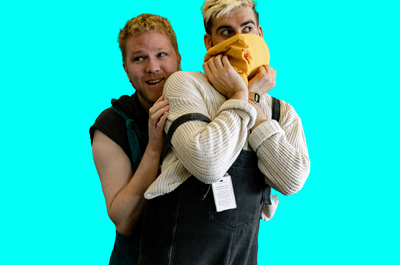Cerys-Leigh Phipps reviews CHOO CHOO! You Are Not Your Thoughts, a production from StammerMouth which deals with the complexities of living with OCD.
When our thoughts start to become too much, when they seem as though they are not of our own creation, the natural human reaction is to repress and hide them. However, StammerMouth’s second original production CHOO CHOO! You Are Not Your Thoughts chooses to expose these frightful and often disturbing feelings as they welcome the audience into the mind of an OCD sufferer. Best friends Duncan and Nye do everything together: they play games, listen to the radio, and sing songs together. Nevertheless, this cute, light-hearted atmosphere quickly transforms into chaotic hysteria full of dark comedy as Nye’s intrusive thoughts begin to leak into the play’s action and we the audience, along with Duncan, try and figure out what they are and learn how to deal with them.
Mental health conditions and the complications they can cause has thankfully become a far more acceptable topic of discussion, yet there’s still many lingering stigmas which is why productions such as StammerMouth’s CHOO CHOO! are so important. Not only is this performance educational, but it is also reassuring to those that can relate to the problems raised throughout the piece. Through its comedic sequences, which heavily use slapstick comedy, the performance cleverly humanises the symptoms commonly found with OCD including intrusive thoughts, the fear of change and low moods and great anxiety. However, the performance is equally as heart-warming as it is hilarious (as dark as this comedy may be) as the tone can quickly lighten from making jokes about pushing an elderly woman down the stairs and being scared to cut into a loaf of bread, to the final, beautifully moving moments of the piece which involve Duncan helping Nye through one of his biggest fears; that he is going to hurt his best friend.
Taking centre stage, the two performers stand in silence as Duncan proves to Nye that these thoughts are just in his head. In the tear-jerking scene, we see the actors hold up a knife, but rather on acting on his intrusive thoughts, Nye is able to put the knife down, proving to both himself and the audience that these thoughts do not represent true feelings. Juxtaposing the rest of the performance in its simplicity and realism, these final moments really hit home the message StammerMouth wishes to get across; that these thoughts, no matter how horrible they are, are not your own. Thompson and Hallis’ performance in these moments is truly breath-taking. Stepping away from the comedic roles they have played up until this point, both performers present a sense of real vulnerability, as they stand, exposed to the audience, breaking through Nye’s fear.
Although the themes StammerMouth discusses throughout the piece are heavy, they choose to dramatise them in a way that is child-like in its innocence. With the performers dressed in matching dungarees and the stage being filled with bright colour-changing life-size building blocks, the whole performance feels as though you are in a child’s playroom. It is clear from these choices that CHOO CHOO! is a highly stylised piece of drama. Audience participation plays a vital part in this immersion, as Duncan and Nye speak directly to them and even involve them in their activities. Each pulling up a chair, the two performers force the audience to play a game in which they must talk about a random topic for one minute with no hesitation or repetition. An anxiousness can be immediately felt during these moments by audience members, as the performers cleverly show the audience just a glimpse of what living with OCD can be like; stressful, confusing, and chaotic. Another entertaining yet eye-opening game the performers play involves an “Agony Aunt” style show in which they take on the role of advice-givers. When Nye “writes in” explaining his frightening thoughts, he is met with utter shock and is labelled as “psycho”; in doing so, highlighting the unfair and prejudiced perception OCD sufferers have to endure.
StammerMouth’s driving aim is to discuss what is difficult to talk about; and this production achieves this and so much more. CHOO CHOO! You Are Not Your Thoughts is equal parts entertainment, education and eye opener. As theatre companies go, StammerMouth are one to watch.
Find out more about CHOO CHOO! You Are Not Your Thoughts here.












